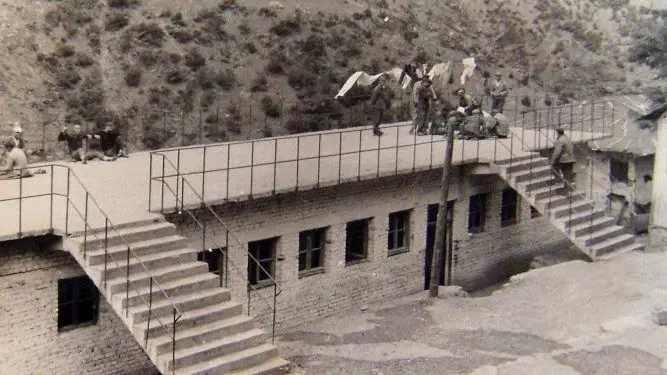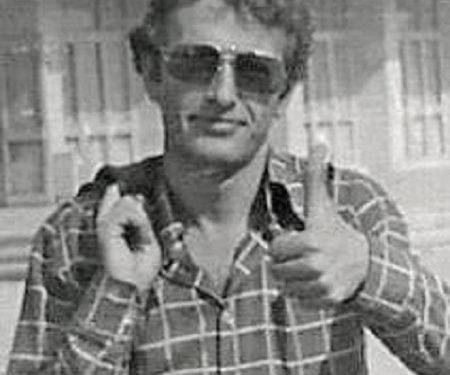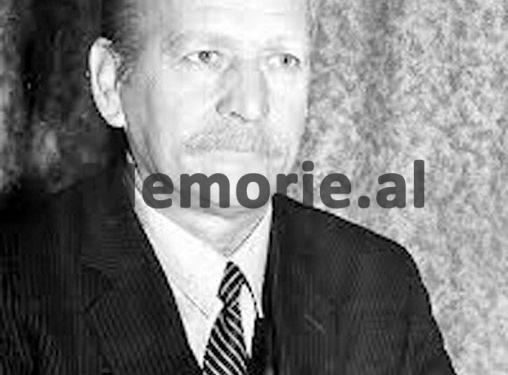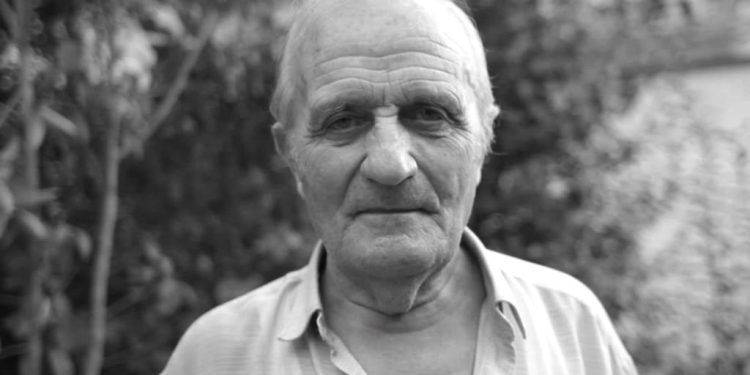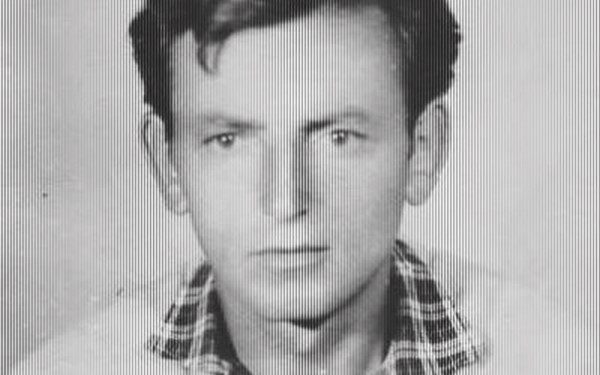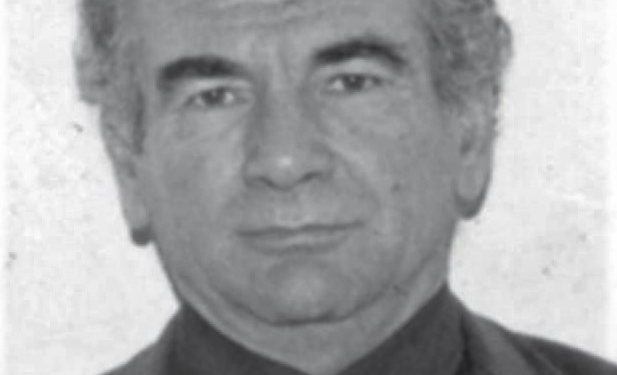By Maksim Rakipaj
Part fourteen
Memorie.al/ Maksim Rakipaj, originally from Përmet, whose family had helped and supported the Anti-Fascist National Liberation War, after graduating from the Navy School in Vlorë, in 1972 he was appointed an officer in the Merchant Navy, where he served with dedication until in 1977, on the “Durrësi” steamer, he was arrested and sentenced to 15 years in political prison, as part of a “group”, which also included his colleague, Aladin Kapo, the son of Hysni Kapo’s brother. Family biography was also the reason for his punishment. After the end of the war, two of his uncles were sentenced to political prison, his grandfather was declared a kulak and in 1976, his father was expelled from the party. Maksi began serving his sentence in the Ballsh camp and in 1979, he was transferred to the Spaçi camp and then to the Qafë Bari camp. He was released on September 12, 1984, benefiting from a reduced sentence, from an amnesty. After being unemployed for a long time, with many hardships, he got a job as a miner in the Mzezet mine, he worked until 1991. After the 1991s, he started working in the administration of the Municipality of Durrës, he served until 1997 and after that, he returned to the Merchant Navy (the last captain of the transoceanic ship “Vlora”), until he left Albania for Italy, (illegally on a dinghy), where he currently lives for many years. Since the 90s, in addition to various jobs, Maksim Rakipaj has also devoted himself to writing, such as; poetry, prose, fiction or documentary, translations, etc., publishing several books, such as: ‘Prophet – Khalil Gibran’, (translation from English ‘Toena’ 2003), ’20 love poems and a song of sadness’, (translation from Spanish, ‘Toena’ 2003), ‘Alive after the shipwreck’, (published by ISKK, 2014), ‘Bukowski – poetry’, (translation from English, ‘ENEAS’, 2015), ‘Trilusa m’Tirône’, ( translation from Italian, ‘UEGEN’, 2015), ‘Anthology of Arabic-Persian Poetry’ (English translations, ‘UEGEN’, 2015), ‘The Complete Sonnets of Shakespeare’, (English translation, ‘ADA’ 2016′) , ‘Survivor’ (autobiographical novel, ‘2 East, 2 West’ 2018), ‘Nobelists – poetic anthology, (UEGEN 2019), ‘Hymn of happiness’ (‘JOZEF’ 2023), etc. From the creativity of Mr. Rakipaj, Memorie.al is publishing the book “Survivor”, (published in 2022 by “JOZEF” Publishing House in Durrës, directed by Mr. Aurel Kaçulini), where he has described his life chronologically, where the part the main one is that of serving the sentence in camps and prisons, as well as various characters, his co-sufferers that he met in the communist hell, etc.
A suicide
…Spac, December ’79. Here winter is harsh and not only winter. Today is Sunday, a day off. You have time to meet your friends, who are on different shifts than you. I like Sunday because I have more time for my friends, I read Zydi Morova’s stories and poems, Visar’s poems, I discuss with Islam Spahiu, Hiqmet Myzyri, I drink coffee with the wise Ahmet Kolgjini, I hang out with Kosovar Hasan Kukali, who no matter how tired he is, and he still stays all day laughing and showing off his face.
Calm in the camp…! This morning, I’m having a coffee with my good friend, the writer Halil Laze, who tells me: “I have a couple of kilos of flour, in the food box; I’m saving it for halva. If bogeyman doesn’t die (he was talking about Enver Hoxha), until June, I will go out and spread the flour in the wind, on the terrace…”!
…When they heard some shouting outside: – “Don’t! F., don’t cross the wires”! …Prisoner F. was locked in himself. He did not forgive himself for agreeing to become a spy. The coldness of the people tormented him. He had decided to kill himself. Today it is approaching the restricted area. There is a sign marked “NDAL”, then there are three rows of barbed wire and searchlights. After the third barbed wire fence, about 3 m. high, are the guard posts with Machinegun.
They have an order to kill any of the prisoners who approaches the “NDAL” sign and for the murder committed, they are decorated and receive two weeks leave. The soldiers are terrified of the prisoners. The commissar tells them stories every day, with dangerous agents who are hundreds inside the wires and some of them are able to cross all three wire fences with just one jump, disarm and decapitate them with only their hands. The soldiers believe the commissar’s tales; most are from remote and ignorant villages.
They believe that we are the ones who want to destroy the “joy” and “happiness” of the people who are “successfully” building socialism. But the soldier who is in service today has not yet been robotized. He is not seeing a dangerous enemy, who threatens his life and the happiness of the brave, freedom-loving people…! The soldier sees a man who just wants to die, to end his suffering. Calls: – “Stop! Stop, because I will shoot”!
Prisoner F. overcomes the first fence with difficulty and bleeding. He starts to climb the second fence…! “Don’t, man! Don’t do this to me! Stop, because I don’t want to kill you…”! The soldier’s tone is pleading now, not commanding, like the first call. The prisoner crosses the second fence… another two meters separate him from the last fence. The soldier’s pleas to stop are answered without a word; with a gesture he shows his chest, as if to say to the soldier: here is your target…!
The soldier shoots in the air. F., continues forward, grabs the last strings by hand. The soldier fires, a short burst. Not in the head, nor in the chest, as the Party ordered them daily, through the voice of the commissar. He shoots him in the leg, below the knees. F., falls in the white snow. The soldier drops his weapon and covers his head with his hands: “What did I do”! Remembering that he killed him…!
But F. was alive. He had received a slight leg wound. When he returned to the camp from the hospital, he didn’t even limp…! Everyone hugged him when he returned to Spaç and congratulated him with all their hearts: “Thank you for saving, F…, the past”!
– The soldier was not given two weeks of paid leave. They scolded him severely, in front of the ward. They took away the right to do military service. They said they transferred him. Someone said, that then they arrested him…!
Why did F. want to kill himself?! Eh, what does it matter?! Even today there are people who kill themselves; even today there are people who do not take their lives to earn a reward. Or not?!
Ije Farka denounces Enver Hoxha; spy of the invaders?!
After they crushed Spaçi’s revolt with terror, with 5 shootings and thousands of years of re-sentences, the vampire was still not satisfied with that. The blood of 4 heroes and “Tart”, the hero dog of the 1973 revolt, was not enough. Convictions, reconvictions and new prisoners came every week. In December ’82, when I was transferred to Qaf-Bar, I left over 1,200 people in Spaç. In addition, the bandits in power also condemned the camp. The camp was sentenced to 5 years of no games, no chess and volleyball, no movies, no TV, no books.
More than a year after the revolt, he worked on Sundays and holidays, without a break. Finally, the punishment for the camp ended, they began to be allowed: chess, dominoes, later also books. But always under the watchful eye of the command, the police and the “basins” of the Office of Reeducation. They also brought an “Iliria 24” television, which they placed in the large meeting hall. Bujari and Everest adjusted the antenna. The allowed time for watching TV was also set, until 9:30 p.m., or until 10 p.m. I think. Great fun. There were those who had never seen television. All programs were consumed: children’s, sports, science shows, various anniversaries, news, movies…!
November 29 was approaching, the most beloved holiday of the party, the day of “liberation”, and on that occasion, there were always documentaries, interviews about the lives of the heroes of the “liberation” war. The hall is full. The television gave memories of Vojo Kushi and two others who were killed by the Italian fascists at “Kodra e Quqe”. On the screen, the lady of the house where the three heroes were killed, Ije Farka. That day in November 1979, the VATS journalist was interviewing the only survivor from the Red Hill incident:
– “Nona’s three boys came that day…! Vojo was fine, two others: one injured, one sick, with tuberculosis…! You gave them a drink; I fixed their veins with a flute…
“Come on,” Vojo tells me, “open your eyes, there are spies all over the place, don’t look at me, you have other people, push me…! and listen: Who! You don’t have to tell anyone that I myself am not here. Did you understand me?
– Don’t worry, I’ll be with you, – I tell him…! Last night, I slept with my grandmother’s bags, for a couple of nights it gave me trouble…! I didn’t open my mouth, I didn’t tell anyone, not even those in the party, that Vojo ordered me…! I’m nobody…!
When on the third day, lunch, there from 4 o’clock, there was a knock on the door…! I was so shocked when he spoke, the good one, the beautiful one; it was Enver Hoxha himself…!
Someone opens the door before me; I grabbed him by the neck…! Vojo went away; the two of them grabbed each other’s necks. ‘What about you, here you are’?! Asked Enveri Vojon with concern. Why didn’t you tell me that you are here, you have Ija…?! Let’s come and meet, they need some medicine! I left my bags and chatted; I went out and bought coffee. Someone is drinking coffee, Enveri, my mother’s son, says to me: ‘Come on, be careful, my friends! I am going out…’! – Don’t worry, I’ll be with you! My brother Enver Hoxha… thank you, I told you that it was half an hour before he came out, except when he was making fun of the whole neighborhood…”!
Ije Farka continued the sad story (in 1942 she was not old at all!) and did not forget to repeat: “Thank you, thank you, the paint with me that Enveri sent to my aunt…”!
… Hiqmet Myzyri, who was always sitting next to me, says in my ear: – “I didn’t just kill Qemal Stafa, this Gyrokastri dilly-dally…”!
After some years, Ije Farka’s dearest grandson, who had more than a son, was arrested, ing. Ismail Farken, for agitation and propaganda. Ija, the annual figure of Radio-Television, was no longer seen on the small screen…!
(Note: This documentary was in the VAT archives, I don’t know if it is still there…?)
INTERMEXO III
Animals in our prisons
“Have you”
Animals and prisoners…a whole novel could be made. It is a great mystery, the powerful bond that animals manage to form with humans, in general. But in prison, this relationship, for reasons that are easy to guess, is 100 times…! Every prisoner has his memories of the people he met in prison. Beautiful or bitter, it depends. But memories of animals, however painful, are always beautiful memories.
Which of those who have been in Spaç, in the years ’80-’82, does not put their lips on the gas, when they remember the dog named “Bol”, which was first raised by Xake Bregu, then became everyone’s friend? Who doesn’t cry, even without knowing him, for “Tarti”, the hero dog, who was shot together with the 4 heroes of the Spaç Revolt in ’73…?! There are some of the most incredible stories about animals in prisons. Cats and kittens, storks, mice, mules, dogs, birds…!
In the first days of my arrest, in the dungeon, I befriended a spider. I called her Meri…! We spent about a month together, and then they killed him, when he painted dungeon no. 26, worried, why I was throwing flies to feed him…!
In the concentration camp in Ballsh, there were many cats, especially tomcats: “Çarli”, “Qemali”, “Niku”, “Benzi”, and the most famous of all: “Kuqo”. As for the cats, there was “Nusja” (Kuqo’s sister), “Zenepja”, and the one I want to tell you now, Keti…!
– “You didn’t know Keti, Makso”, – a friend of mine, also a cat lover, told me those days. – “This little one, the only one that remained alive, newborn, from that wretched, Gaqo K., who had received the order to exterminate them, took and raised S., (I can’t remember her name). As a child he raised…! He fed him milk, soaking his little finger, until he fashioned a pacifier for him. Where did you find the milk?! He prepared it with powdered milk, which his family brought him…! He raised “Keti” as his own child. “Keti” did not approach anyone, only him. When S. went to work, “Keti” hid by his mattress, no one saw him.
As soon as S. came back from work and called her “Keti”, only then she ran out and jumped on his chest…! This S. served the years of his sentence and the day of his release came. He prepared his spoils, took “Katie” with him, who had already grown up…! “And where did you send this cat”?! Policeman Ali, the worst of the Ballshi camp, took revenge…! “My cat, bro, ‘Keti’. They all know it, which is incense, I grew it myself”! “You can’t take the cat, it’s not allowed”! “What are you doing, Chief Ali?! The cat is not condemned to…?! “Are you going to close it, or how are you?! He told G.K., more, to come and find a place for this cat, as he knows…!
Cat, as if she knew what was waiting for her, disappeared in a flash. S. came out of the camp, in tears…! When he got out of the enclosure, all the prisoners, who had found out what was happening, heard the sharp call of the corsair S.: – “Keeetiiiiii…”! Everyone, in tears, saw “Katie”, from where she came out and jumped out of the barbed wire, straight into her friend’s arms…!
…In July 1980, when I had my birthday, in addition to my eternal mother and brother, Dashamir, my sister, Elsa, came to me with her two children: Isis and Erin, who was born after my arrest and did not know me. Isida (6 years old) looked at me scared. It didn’t occur to her that this bald-headed man walking around in these clothes was her uncle, but he didn’t speak. In the middle of reciting her most beloved poem: “Our Tanya is crying a lot / the ball fell right in the river”, as soon as she said the word – spoils (Russian) – “cry”, she gave in to the sobbing, huddled behind me. We told everyone: “Don’t worry; uncle will come home in a little while. What’s wrong with you, you’ll see.” In a pause between Isis’ sobs, when I was trying to wipe away my tears, the voice of three-year-old Eri was heard: “Uuuu, cat”! Isis stopped crying. “Kuqo” of Spaç, entered and greeted my beloved people, took his share and left.
4 – Even imprisoned dogs…!
I did not find “Chap” when I arrived at the concentration camp in Ballsh, but I found many memories of him. The prisoners talked about “Chap”, as if they were talking about a friend of theirs, but always with pain, or with a sad smile: “Ehhh, they shot the desolate ‘Chap’, they shot him”!
It is not known how that little brown dog (like the prisoners’ uniform) ended up inside the camp. Someone said that; he had brought one of the prisoners, who worked with the construction brigade, there from Azotik; someone, laughing, said that; he was convicted by the court of Fier, for agitation and propaganda because he urinated next to a wall, where the portrait of the glorious leader was…! Anyway, “Çapi” became friends with everyone. They even said that he knew the prisoners by name. “All of you, Makso, gave a letter to ‘Chapi’ and said: – ‘Come on, ‘Chapi’, I’m taking this letter to Sela! – There was no way; you didn’t give it to the boy, only to him! If he didn’t find Sela, he would return the letter back, crying, as if to say, “I didn’t find him…”!
But once, he was seen by the camp’s worst policeman, Ali. He saw “Capi” with a letter in his mouth, followed him, caught him, but “Capi” as if he were a man, swallowed the letter and did not hand it over to policeman Ali. Out of anger, policeman Aliu kicked him in the ribs. Since that day, policeman Ali did not dare to enter the camp anymore because “Çapi” rushed at him as if furious, but “Çapi’s” friends always managed to avoid a fight; “Open” – Ali. “Çapi” felt it immediately, as soon as Ali was ready to enter the camp; whoever was next to “Chap” spoke to him, scolded him, and told him to contain his anger…: “Don’t do this, “Chap”, just for a kick… Oh, how many kicks we have had”! And “Capi” obeyed, reluctantly, but obeyed with a broken heart, humming to himself, as if he wanted to say: “Well, (iiu), you (ugrrruuu) know better, you’ve taken the hand of the prison (hum, hum)”! But what was expected happened. One evening, two pistol shots were heard from the wing of the command offices. They felt all the evil: – “Don’t! They killed the desert ‘Chapi’ for us”! And mourning covered the camp.
But in Spaç and in all the communist prisons, the legend of the hero dog, “Tart”, was alive, that he, like the four heroes of the Spaç Revolt, who refused to lie on the ground and be tied like all the prisoners, did not surrendered, but fought to the end alongside 4 heroes, against the cannibals of the communist state. In his memoirs, a participant of the revolt also wrote a poem-elegy, about the hero “Tarti”. I read that elegy, not without tears, in a comment made by Neritani, the son of my friend, Ahmet Kolgjin.
Why is such a powerful bond between animals and prisoners?! I have often thought about this. Well, with cats and dogs there are plenty of friendship stories, even with non-prisoners. What about the stork of the salt flat of Vlora, which accompanied the prisoners to and from work? The prisoners would leave their work as soon as the stork rose into the air; the policemen checked the clocks and, surprisingly, it was time to leave work…!
Once, when I was on the second shift in Spaç, I saw that someone had taken up company with a mouse. While Islam Spahiu was filling the wagon, Ahmet Kolgjini went a little further to smoke a cigarette. I approached too. It was a pleasure to have a cigarette in his company. Ahmeti, as soon as he saw me, signaled me not to make noise. I approached without feeling and saw that he was giving some bread crumbs to a black mine rat: “Don’t be afraid, Max, it’s my friend”! And the mouse continued to eat, without spoiling Teresa. Ahmeti told with smiling: “It’s been three months, he’s always coming and it’s up to me”!
…This connection comes, perhaps, because the animals feel that a prisoner has a lot of love to give. Man, when he does not receive love, surprisingly, is able to give, many times more, than when he receives it. The animal feels this, because we apparently strongly radiate the need for love, when it is denied, taken away, violated. In prison they give us “to eat” hatred, in bulk, we “eat” it without feeling and turn it all into love…!
… One morning, the prisoner Riza Bregu, going to the prison, saw a small puppy on the stairs, which came in front of him wagging its tail…! He opened his eyes, because he did not understand how he could have arrived there, that little puppy! He took him with him and gave him his own ration of milk. Someone asked him: “What do they call this little bowl, O Xake”!
“You found it, it’s called ‘Bol’,” answered Rizai, laughing. The Spacians immediately “adopted” “Boli”, who seemed to be a graft, of a Stan dog, with some bastard, short hair, white, with brown spots. “Boli” grew quickly, that hole that Xakja had made for him, in the storehouse of greens, no longer darkened it. He ate everything “Boli”, whatever you gave him: olives, watermelon, apples, pie, pilaf, marmalade…! To sleep, he entered Rako Kristo’s bed, which was sleeping, without taking off his mining boots. When he was about one year old, “Boli” started going to the mine, with the prisoners. He deftly escaped the eyes of the police, who were checking the entrances and exits to the mine. The command of the camp did not like this, and thought to eliminate “Boli”.
One day, we found “Boli”, lying in the square in front of the bufe, with his eyes closed and white foam coming out of his mouth. They had poisoned him! In the ambulance, there was no antidote. One of the prisoners brought a liter of olive oil from the food the family had brought and threw it all down the throat of “Boli”, who was barely able to swallow. “Boli” was a powerful dog, and he threw that turn, but he never came close to the camp kitchen, where it seems, they had poisoned him. The command did not leave it at that; one afternoon “Boli”, entered the camp bleeding. They had shot them in pairs. The treatments that time came from the camp ambulance, the prisoners took out all the bullets that had penetrated the body of “Bol”, who remained motionless during the operation. For several weeks, “Boli” was blinded.
Everyone was worried about his health, but he recovered that time too. When he was released, Xake Bregu asked for permission to take him with him, but he was not given it. Apparently, the punishment of “Boli” would still continue…! In Qaf Bar, where I was transferred, someone brought me the news that Bol had been shot. One of the policemen shot a cartoon of “Kalashnikov”, “Bol” in the desert. And as far as I know, “Boli” was not sentenced to death by any trial…! Memorie.al




